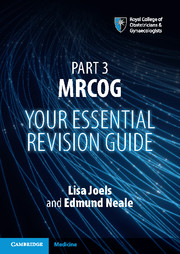Book contents
- Frontmatter
- Contents
- Foreword
- 1 The Part 3 Clinical Assessment in the Context of the MRCOG Examination
- 2 Core Clinical Skills
- 3 The Modules of the Curriculum Assessed in the Part 3 Exam
- 4 Tips for Candidates
- 5 Practice Tasks with Videos
- 6 Revision Resources
- Appendix 1 Part 3 MRCOG Clinical Skills Assessment Template
- Index
5 - Practice Tasks with Videos
Published online by Cambridge University Press: 05 September 2016
- Frontmatter
- Contents
- Foreword
- 1 The Part 3 Clinical Assessment in the Context of the MRCOG Examination
- 2 Core Clinical Skills
- 3 The Modules of the Curriculum Assessed in the Part 3 Exam
- 4 Tips for Candidates
- 5 Practice Tasks with Videos
- 6 Revision Resources
- Appendix 1 Part 3 MRCOG Clinical Skills Assessment Template
- Index
Summary
Task 1: Meconium Stained Liquor (Simulated Patient Task)
This task relates to module 6, management of labour (core curriculum module 10).
Candidate's Instructions
This is a simulated patient task assessing:
• information gathering
• patient safety
• communication with patients
• applied clinical knowledge.
You are the ST5 on call for the Obstetric Unit and have been asked to review Mary Bold, who is a patient in the Midwifery-Led Unit downstairs. She is a primigravida at 41 weeks’ gestation who presented earlier this morning in spontaneous labour.
She had spontaneous rupture of her membranes ten hours ago and was 3 cm dilated at that stage. She is contracting 2–3:10 minutes and the contractions are lasting 20 seconds. Fresh meconium has been identified and the midwife has confirmed that the lie is longitudinal with a cephalic presentation, the head being 2/5 palpable. A vaginal examination shows that the cervix is still 3 cm dilated, fully effaced with the head 1 cm above the spines with caput +. The midwife has asked you to review the case and agree a management plan with Mary.
You have ten minutes in which you should:
• establish the full extent of the situation, including the patient's wishes
• manage the immediate situation and agree a plan for the labour
• advise on the next steps to be taken
Spend two minutes thinking about how you would approach this task, making notes if it helps you. Think about how you would approach this situation; what communication skills do you need? Consider how you would establish a rapport with the patient and identify her concerns and respect her autonomy. Then watch the two videos linked to the task. Make notes about the performance of the actor playing the role of the candidate in the core clinical skills that are being assessed in this task. For each of the clinical skills, decide if the candidate's skills are at the level of a pass, fail or borderline.
After you have watched and scored this task you can compare your assessment with the comments of trained Part 3 clinical and lay examiners. The aim of this process is to show you what behaviours are expected and to understand how you will be marked when you attempt the Part 3 examination.
- Type
- Chapter
- Information
- Part 3 MRCOGYour Essential Revision Guide, pp. 104 - 151Publisher: Cambridge University PressPrint publication year: 2016

